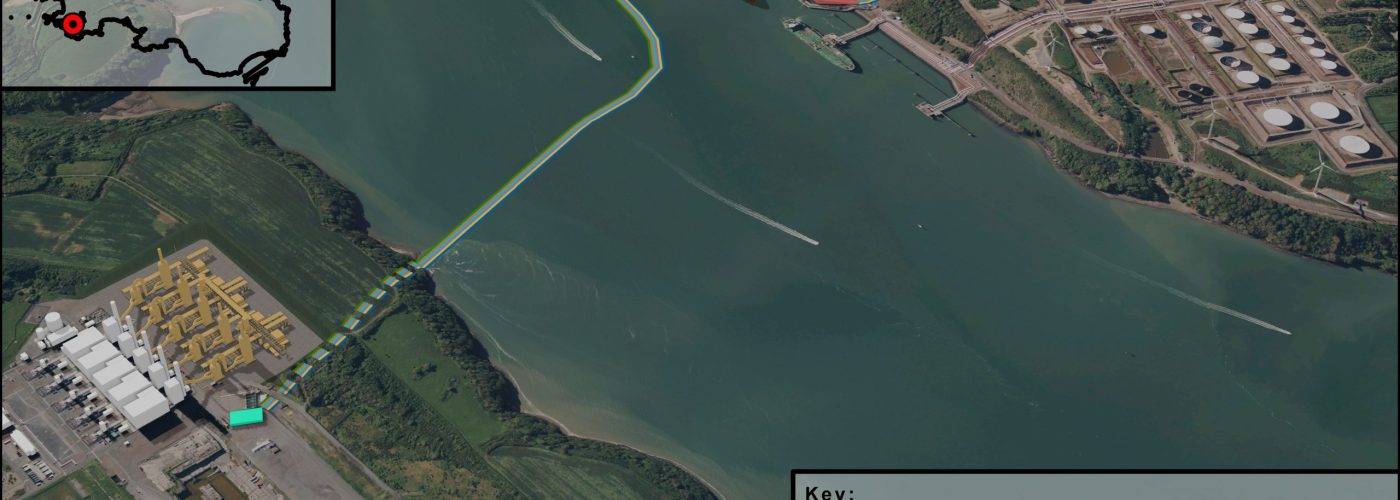RWE, the largest power generator in Wales, and Dragon LNG, one of the three UK LNG terminals providing energy security into the UK, have awarded a contract to AtkinsRéalis, a world-leading design, engineering and project management organisation, to carry out an engineering study for their collaborative project ‘MUST’ – Multi-Utility Services Transit – an infrastructure project connecting industry across the Milford Haven Waterway.
The study will examine the environmental robustness of technical solutions and determine if any of the potential transit opportunities, including the transfer of residual process heat, export route for CO2and blue and green hydrogen, could reduce CO2 emissions on both the South and North side of the Haven.
Depending on the outcome of the study, the opportunities that the MUST project could potentially provide are:
- Full elimination of CO2 emissions from Dragon LNG’s regasification process by utilising the residual process heat from the generators at RWE’s Pembroke Power Station
- Establishing an export route for CO2 from a potential carbon capture plant being developed at Pembroke Power Station
- Enabling the development of a CO2 liquefaction, storage and shipping capability at Dragon LNG
- Establishing an additional export route for blue and green hydrogen (H2) from the south to the north side of the Milford Haven waterway with potential hydrogen from RWE’s Pembroke Green Hydrogen projects
- Create an opportunity for other industries to access a key piece of infrastructure across the Milford Haven to enable broader industrial decarbonisation. This could include supply water, direct wire connection (potentially from offshore renewables) and other utilities or products.
Richard Little, Director of Pembroke Net Zero Centre, RWE commented: “This appointment demonstrates the commitment both RWE and Dragon have towards developing decarbonisation options for the whole of South Wales and is a key part of RWE’s Pembroke Net Zero Centre (PNZC), a major multi-technology decarbonisation initiative in South Wales.”
Simon Ames, Managing Director, Dragon LNG and Dragon Energy commented: “We are excited to be entering into this important project phase with AtkinsRéalis who will provide recommendations for or against proceeding with project aspects. We continue to work with government and regulatory bodies to ensure we are in a position to progress forward once the results of the study are available in 2024”.
Sarah Long – AtkinsRéalis Market Director for Net Zero Energy, said: “The MUST project is a great example of the innovation that will drive forward the decarbonisation of industry at scale and support the development of new technologies that will be vital in the net zero transition. We welcome the opportunity to build on our longstanding relationships with RWE and Dragon LNG and look forward to bringing our knowledge of transit, marine, environment and process plant integration to such a multi-faceted project.”
MUST is a key deployment project of the South Wales Industrial Cluster, Dr Chris Williams, Head of Industrial Decarbonisation, Industry Wales, commented “SWIC is excited to see the MUST project develop as an example of industrial symbiosis (sharing), which will be a key element of industry in a net zero world. The sharing between and interconnecting of industries to limit waste and reduce emissions can unlock industrial sustainability, attract inward investment and help secure local jobs. MUST is an exemplar of the type of investment needed to support our industries on their net zero journey – as showcased in the SWIC Cluster Plan.”
As a collaborative, flagship component of the South Wales Industrial Cluster (SWIC) Deployment Project, the MUST project would represent a step change in net zero infrastructure. The project is supported by an award from UK Research and Innovation (UKRI’s) Industrial Decarbonisation Challenge programme, which will provide key support in the engineering and design phases of the project.
Building, Design & Construction Magazine | The Choice of Industry Professionals





